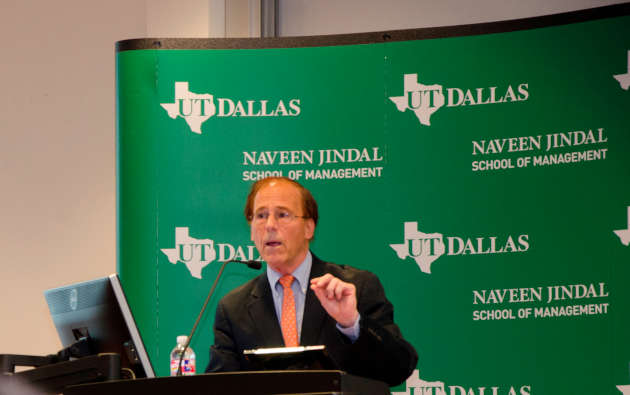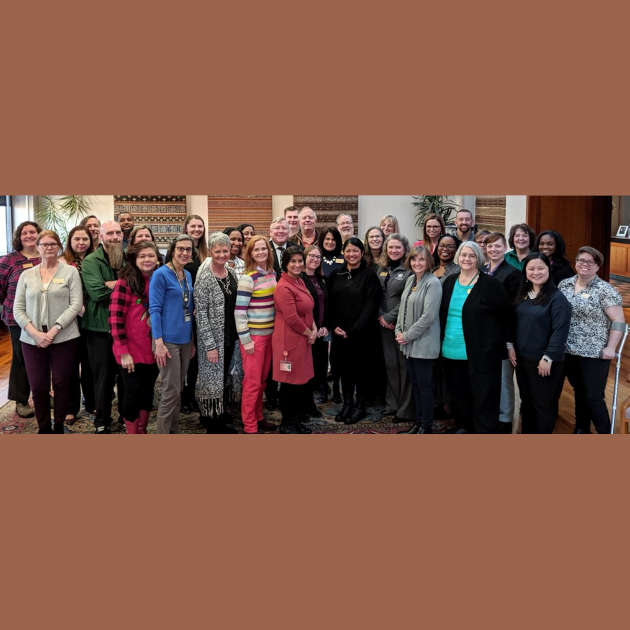
The most common mistake taxpayers make when coming to court to protest their income tax bill is not being fully prepared, U.S. Tax Court Judge Albert G. Lauber recently told a packed auditorium of students at the Naveen Jindal School of Management.
Lauber was in Dallas Oct. 20 hearing local tax cases and took a break from the bench to speak to some 300 students, staff and faculty in the Davidson Auditorium. Although the U.S. Tax Court is physically located in Washington, D.C., its 19 presidentially appointed judges travel nationwide to hear cases involving taxpayer disputes with the Internal Revenue Service.
The majority of the cases Lauber hears, he said, are simple cases that require taxpayers to document the deductions they have claimed; however, many don’t organize their receipts and documents.
“If you’re a contractor and you have all these different expenses for insurance and other expenses, and you have all your invoices and receipts organized and tabulated, you’ll probably have a very strong case. In fact, the case would probably get settled with the IRS if you could do that,” he said.
“The most common mistake is if you come in with a duffel bag full of random documents. What do I do with that? I’m not going to go through them one by one and sort them out,” he said. “We don’t expect a taxpayer to know about the technicalities of the tax law. What we want them to do is just be organized and present the facts of their case in a comprehensible, efficient way.”
Most disputes are worked out between taxpayers and the IRS before ever getting to court, says Lauber, but those that are not are filed in the federal tax court. About 30,000 cases are filed each year in the federal court, but judges only issue opinions in about 1,000, and the rest are resolved.
“The IRS is represented in our court by lawyers of the IRS Chief Counsel’s office, and they are by and large reasonable people who try to reach a fair outcome. They’re not so much trying to get the most possible tax; they’re trying to get to the correct tax, and they are very good at settling cases,” Lauber said.
Nominated to the court by President Barack Obama, Lauber has served since 2013. His distinguished law career includes past service as a clerk to the late U.S. Supreme Court Justice Harry A. Blackmun and as a tax assistant and deputy solicitor general in the U.S. Department of Justice. A longtime partner in a Washington, D.C. tax firm, he also previously served as director of the Graduate Tax and Securities Program and continues to serve as a visiting professor at the Georgetown University Law Center.
“I was impressed by Judge Lauber, particularly his logical thinking and approach to tax cases. His professionalism encourages me to read carefully and think logically when reading cases in my taxation class,” said Yahui (Ryan) Ren, a finance student planning to pursue a career in alternative energy investing. Ren is one of many students taking accounting professor John Gamino’s Fundamentals of Taxation course who attended the lecture. Gamino was responsible for contacting Judge Lauber and getting him to speak at the Jindal School.
Lauber’s court handles a wide variety of tax litigation, ranging from simple cases involving substantiation of deductions to the incredibly complicated cases involving international transfers of technology. Asked by a student which is his favorite, he said he prefers the more complicated ones, such as the high-profile dispute between online retailer Amazon Inc. and the IRS over a $234 million tax bill, a case that has implications for other companies with software assets that may prove difficult to value for tax purposes.
“This area has gotten very difficult in the last couple of years because so much value now takes the form of intellectual property,” Lauber said. “A hundred years ago, you’d be selling iron ore, and there’s a market price for iron ore. You know what the value of iron ore is … What is the value of software that’s unique to Amazon? There’s no comparable price out there and so it’s very hard to figure out what the value of this property is.”
“A judge has to learn different kinds of skills. You have to learn a good bedside manner like a doctor for some of these small cases involving hapless taxpayers who haven’t got a clue to dealing with the world’s biggest law firms and the world’s most important companies. We do the best we can to resolve them all,” he said.





